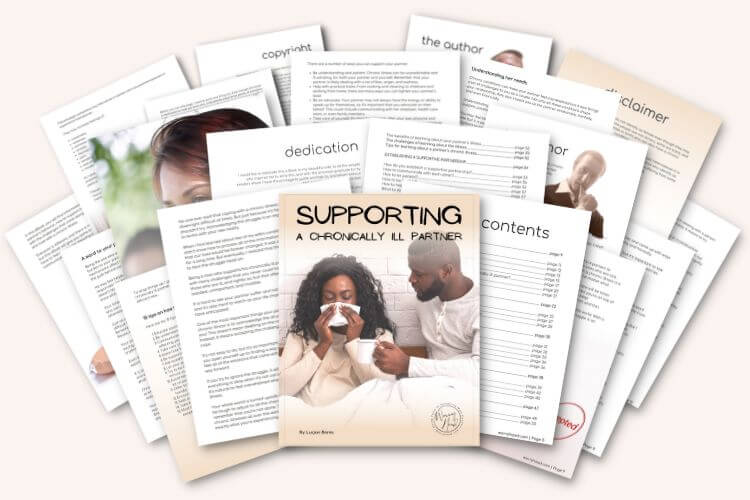How can I help my wife who has two chronic conditions?
It can be difficult to know how you can help your wife who has two chronic conditions, but this article is going to help you answer this question.
Firstly, educate yourself about her conditions to help you understand what she’s going through and how you can support her. Be there for her emotionally, be understanding, supportive, and listen to her. Help with practical tasks, help her with medication, take her to appointments, or do household chores.
Below, I expand on the above steps a little bit more:
- The first step is to educate yourself about your wife’s conditions. This will help you understand what she is going through and how you can best support her. You can ask her doctor for information or look online for reliable sources. I had to learn about endometriosis and fibromyalgia, but it allows me today to be more understanding.
- The second step is to be there for her emotionally. This means being understanding and supportive. Listen to her when she wants to talk and offer words of encouragement. To be there physically isn’t always enough, you need to talk things out, express how you both feel and listen to her when she needs you.
- The third step is to help with practical tasks. This can include things like helping her with medication, taking her to appointments, or doing household chores. I help my wife feel more reassured by going with her to her hospital and doctor’s appointments. Also, I do some of the chores to relieve her from it and to show her my love and support.
By following these steps, you can be a great support for your wife as she copes with her chronic conditions.
How can you help your wife who has two chronic conditions?
There are plenty of ways how I help my wife, but how can you help your wife who has two chronic conditions?
Having one chronic illness is enough to turn someone’s life upside down, but your wife has two (or more) chronic conditions. I know from my own personal experience of supporting my wife with endometriosis and fibromyalgia, that it can be incredibly challenging for her.
Just to stay well is a full-time job, let alone having to work, and take care of daily tasks, not to mention feeling like you aren’t good enough anymore.
It puts a strain on your marriage, but there are many ways you can support her, which in turn, helps you too.
Here are 27 tips on how you can help your wife who has two chronic conditions:
- Educate yourself about her conditions
- Be there for her emotionally – listen and offer support
- Help with practical tasks such as medication, appointments, or chores
- Take care of yourself – remember that you can’t pour from an empty cup
- Find a hobby or activity that you can enjoy together
- Help her to stick to her treatment plan
- Encourage her to rest and relax when possible
- Seek professional help if needed – for both of you
- Be understanding if she has good days and bad days
- Create a support network of family and friends
- Let her know that you are in this together
- Avoid taking on too much – delegate or ask for help when needed
- Don’t be afraid to talk about her chronic conditions
- Respect her decision if she wants to talk about it or not
- Ask how you can help – and then do it
- Take on additional household responsibilities if needed
- Help to make healthy lifestyle choices
- Offer a shoulder to cry on
- Find things to laugh about together
- Provide a distraction from her chronic conditions when possible
- Plan ahead for difficult days or flare-ups
- Don’t be afraid to ask questions about her conditions
- Be understanding if she needs more time for herself
- Encourage her to stay positive and hopeful
- Promote a healthy body and mind – offer massages, relaxation techniques, etc
- Give her space when she needs it – but let her know you’re always there for her
- Tell her how much you love her, every day.
I could expand on all the above tips, but I think they are self-explanatory.
If you want to learn how to cope with your partner’s chronic illness, how to support her struggles, and manage a relationship with a chronic condition, I give away a FREE Chapter of my eBook: “Supporting a Chronically Ill Partner”.
This chapter alone has all the comprehensive information about acknowledging the struggles, including:
- A word to your partner.
- A word to you.
- Stepping on eggshells.
- Understanding her needs.
- How to acknowledge having a chronically ill partner?
- Acknowledging can be hard.
- 15 tips on how to do it!
Get the 1st Chapter FREE!
Chronic Illness for Partners

My wife has multiple chronic illnesses what can I do?
I totally understand what you’re going through because I’ve been in your position for over a decade. Men like to fix things, however, since you cannot fix your wife’s health, you feel useless and helpless.
The first and most important thing you can do is educate yourself about her illness. It’s important to understand as much as you can so that you can be there for her emotionally and practically. It may sound like I repeat myself, but here’s the thing, this is what is going to work best for your wife.
Be there for her, no matter what. Listen to her and offer support when you can. This doesn’t mean you have to agree with everything she says but just offer a sounding board. Support her with practical tasks related to her chronic conditions such as medication, appointments, or chores. This can be a huge help and take some of the load off her shoulders.
Don’t forget about yourself, take care of yourself. Remember that you can’t pour from an empty cup. Make sure you are taking care of your own physical and mental health. It’s very important, I can’t stress this enough.
If you have it, find a hobby or activity that you can enjoy together. This can help to take your mind off her chronic conditions and provide some much-needed distraction and fun. For me and my wife is travelling to Italy, and Latin-Ballroom dancing.
If you feel overwhelmed, seek professional help. This is a big decision but sometimes it can be incredibly helpful for both of you. You can take professional counselling together, or separate, whatever helps…
How to cope with your wife’s chronic conditions?
Undoubtedly, your chronically ill wife should be put first, however, it doesn’t mean you can neglect your own needs and feelings.
My wife’s endometriosis is one of the worst types – stage IV deep infiltrating. It’s a condition characterized by the presence of endometrial-like tissue outside the uterus. This can cause severe pelvic pain, fatigue, and problems with fertility.
For years she has suffered from unbearable pain, fatigue, and nausea. I have had to watch her go through one laparoscopy, and she’s yet to undergo another surgery. She went through countless hospitalizations, and doctor’s appointments. It’s been hard seeing her in so much pain and not being able to do anything to fix it.
I’ve had to learn how to cope with my wife’s chronic conditions. I had to change my approach to her support and adjust.
And then she was diagnosed with fibromyalgia, a disorder characterized by widespread musculoskeletal pain and fatigue. This was a tough one because now she was in even more pain and had even less energy.
Again, I had to learn about this new chronic condition and adjust accordingly.
If you support your wife long enough, you’ll be first to know that it doesn’t end there… your wife most likely developed general anxiety, depression, and maybe like my wife, Obsessive-Compulsive Disorder.
OCD is meant to give her some sense of control over her situation, but instead, this disorder controls her.
So how to cope with all of your wife’s chronic conditions, including the physical ones as well as mental?
Learning about your wife’s chronic conditions is an important step. This will help you understand what she’s going through and how you can best support her. But in order to do it effectively, you have to try and learn about the impact your wife’s chronic conditions have on her mental health.
Let’s explore the most common mental health conditions associated with chronic physical illnesses.
Depression is one of the most common mental health conditions associated with chronic physical illnesses. It’s estimated that 1 in 3 people with a chronic physical illness also suffers from depression.
Depression can be caused by the physical symptoms of the chronic illness, such as pain, fatigue, and nausea. It can also be caused by the emotional impact of living with a chronic illness.
The emotional impact of living with a chronic illness can include feelings of sadness, isolation, anxiety, and fear.
Anxiety is another common mental health condition associated with chronic physical illnesses. Chronic illness can cause anxiety because of the fear of the unknown, your wife may ask herself questions such as:
- Will the pain get worse?
- Will the chronic illness progress?
- Will I be able to cope?
These are all valid concerns that can lead to anxiety.
Anxiety can also be caused by the physical symptoms of the chronic illness, such as chest pain, shortness of breath, and dizziness.
Obsessive-Compulsive Disorder (OCD) is another mental health condition that is often associated with chronic physical illnesses.
OCD is characterized by intrusive thoughts (obsessions) and repetitive behaviours (compulsions).
People with OCD often have obsessions about their chronic illness, such as fears of contamination or worries about the progression of the chronic illness. These obsessions can lead to compulsions, such as excessive hand-washing or checking behaviours.
OCD can be a debilitating condition, but there are treatments available that can help.

How to discuss with your wife your roles in her chronic conditions?
There are two things you should do. Firstly, discuss her needs, secondly, discuss yours.
When one person in a marriage has multiple chronic conditions, their spouse often takes on the caregiver role. For that to occur smoothly, there are key factors you need to discuss with each other.
If you don’t it may lead to disagreements, frustrations, anger, and even divorce. My wife asked me to divorce her on a few separate occasions. It wasn’t due to anger but through grief and sadness. She felt like a burden to me, even though I never made her feel that way.
She asked me to divorce her because she thought I wasn’t happy. I reassured her that I was, and today, after 10 years since our wedding, our marriage blossoms. We are lucky because there is a high chronic illness divorce rate, it is as high as 75%.
So, in order to discuss with your wife your roles in her chronic conditions, you must ask yourself the following:
- Discuss her needs.
- Discuss your needs.
How to discuss the needs of your chronically ill wife?
In order to discuss the needs of your chronically ill wife, you need to understand what her needs are.
Her needs will vary depending on the chronic illness or illnesses she has. But there are some common needs that all chronically ill people have.
These needs include:
- Understanding and empathy from their spouse
- A sense of autonomy and independence
- A feeling of being valued and appreciated
- Trust
- Support
How to discuss your needs in your wife’s chronic conditions?
Just like your wife, you also have needs. And it’s important to discuss these needs with your wife.
Some of the needs you may have include:
- Feeling supported
- Having someone to talk to
- Receiving help with caregiving duties
- Getting a break from caregiving
- Finding time for yourself
These are just some of the needs you may have. It’s important to discuss all of your needs with your wife so that she can understand what you’re going through and she can help you in the best way possible.
Get the 1st Chapter FREE!
Chronic Illness for Partners

Summarising how can you help your wife who has two chronic conditions…
To wrap it all up, here are some key points to remember when helping your wife who has two chronic conditions:
Discuss her needs with her and try to understand her perspective, but you also need to discuss your own needs with her as well and let her know how she can help you.
Don’t forget to take care of yourself. Make sure to find some time for yourself and do the things that make you happy.
Educate yourself about her chronic conditions to help you understand what she’s going through and how you can support her better. Be there for her emotionally, be understanding, supportive, and listen to her.
Help her with all the practical tasks that need to be done, help her with medication, take her to appointments, and lastly, do some household chores from time to time.
I hope this helps. We can chat more if you like, simply leave a comment in the section below. My wife also has two chronic conditions, so I understand what you’re going through.


About Me
Hi, I’m Lucjan! The reason why I decided to create this blog was my beautiful wife, who experienced a lot of pain in life, but also the lack of information about endometriosis and fibromyalgia for men…
